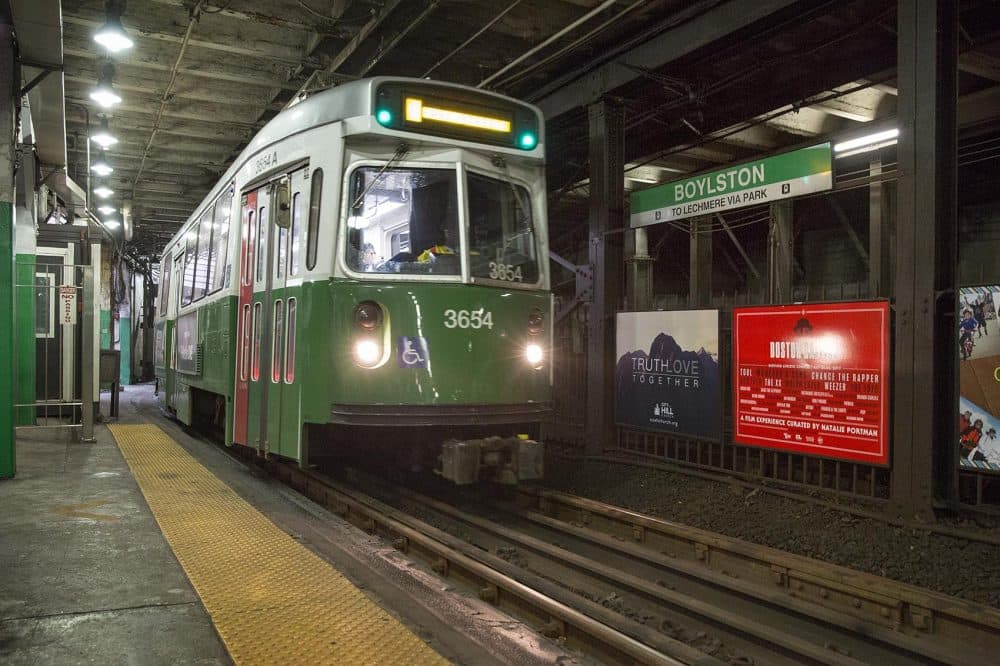Advertisement
Should The T Be Free?

On the heels of an average 6.3 percent fare increase proposed by the MBTA, Boston City Councilor Michelle Wu is arguing to forget those hikes altogether and make the T free for all riders. Skeptics are asking how the state would make up for some $700 million in lost revenue.
Guests
Michelle Wu, Boston city councilor at-large. She tweets @wutrain.
Carolyn Ryan, senior vice president of policy and research at the Greater Boston Chamber of Commerce.
Bill Pfifer, community outreach coordinator for the Mountain Line, a free public transit system in Missoula, Montana.
Interview Highlights
On why the T should be free
Michelle Wu: Everyone should have the right to basic mobility. We're talking about the ability for people to access opportunities that are available in our city, at a time when we are facing the very real risks of climate change and traffic that is snarling all across the Commonwealth. Massachusetts has over the course of our state been a leader when it comes to making decisions in our shared prosperity, in our shared Commonwealth. We started the first public school, the first public library, the first public park — and each of these represented the very ambitious statement that everyone should have the right to access education or open space or our shared knowledge. And each time, it resulted in tremendous jumps in our productivity, in our quality of life. This would be the same. Transportation is a tremendous barrier for people and we should be doing everything we can to encourage people to use public transit and remove every possible financial barrier.
On potential alternative sources of revenue for the MBTA
Wu: If you look at the T's current budget, there are a couple ... points to make. The first is that the T is carrying a tremendous amount of debt, likely more debt that any other major city's system and there have been attempts to address this legislatively in the past. So a lot of the T's budget is paying for that debt service.
The second is that right now fares from riders of our bus and subway system only make up a little over 20 percent of the total revenues from that system. So we're not talking about a sweeping change of overhauling the entire financial structure. It's about addressing a gap that represents a significant barrier to residents. At the same time, we've been having conversations about how to better reflect the cost of people's transportation options, whether it is through congestion pricing or looking at potentially increasing fees on Uber and Lyft, which are undeniably causing more traffic across the city or other ways that we're bringing in sustainable revenues through our tax structure.
This would be an investment just like we invest currently in public education, in our library system and in other benefits that accrue to everyone.
Carolyn Ryan: There's the common goal of getting more people on the T. I don't think the funding stream is quite as simple as just shifting the debt to the state and then making up 20 percent of revenues. So one thing is if you shift the debt to the state, it now becomes something that's paid for by the state. So should somebody in Springfield be paying for my T pass? That's going to be a politically challenging proposition. I think the other part of this is, Councilor Wu mentioned that it's 20 percent of revenues. If you include the commuter rail, you're talking in the ballpark of $650 million a year. I don't know how you wouldn't include the commuter rail in this proposal, especially if this is a cost that's spread out across residents of Massachusetts. I think the funding is a real problem.
On whether Massachusetts could use a corporate financing model to fund the T
Ryan: I think business is willing to contribute to improving our public transit system, but I think we have to be careful about asking them alone to shoulder it. People are invested in the system when they're paying for fares. They care about the quality of service, they care about that world class transit system. Sometimes when things are free they don't care quite as much about service or get as agitated about service or even sometimes the service provider could be well, it's free — what level of service are you expecting? I think that's a risk.
To listen to the full interview, click the audio player above.
This article was originally published on February 07, 2019.
This segment aired on February 7, 2019.


